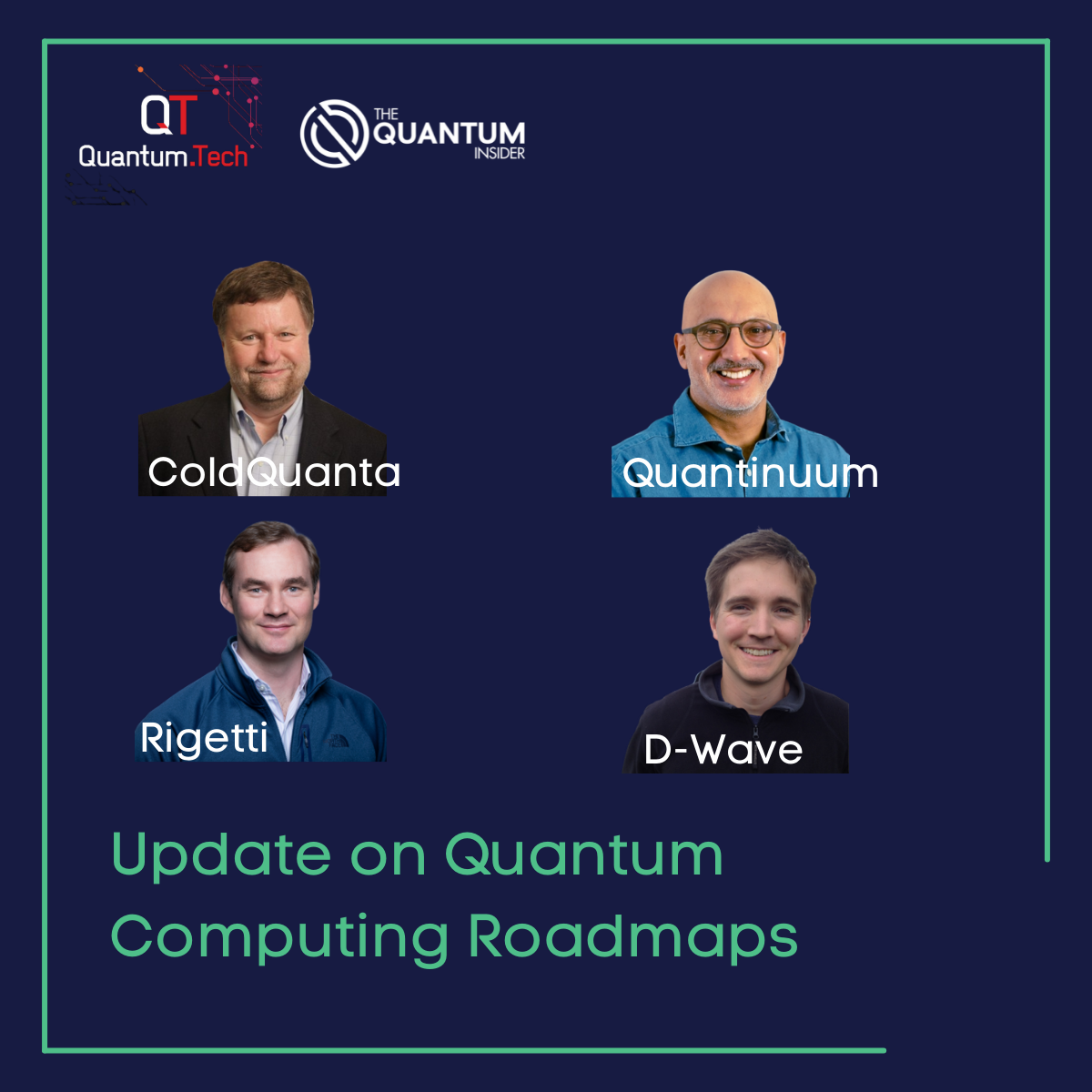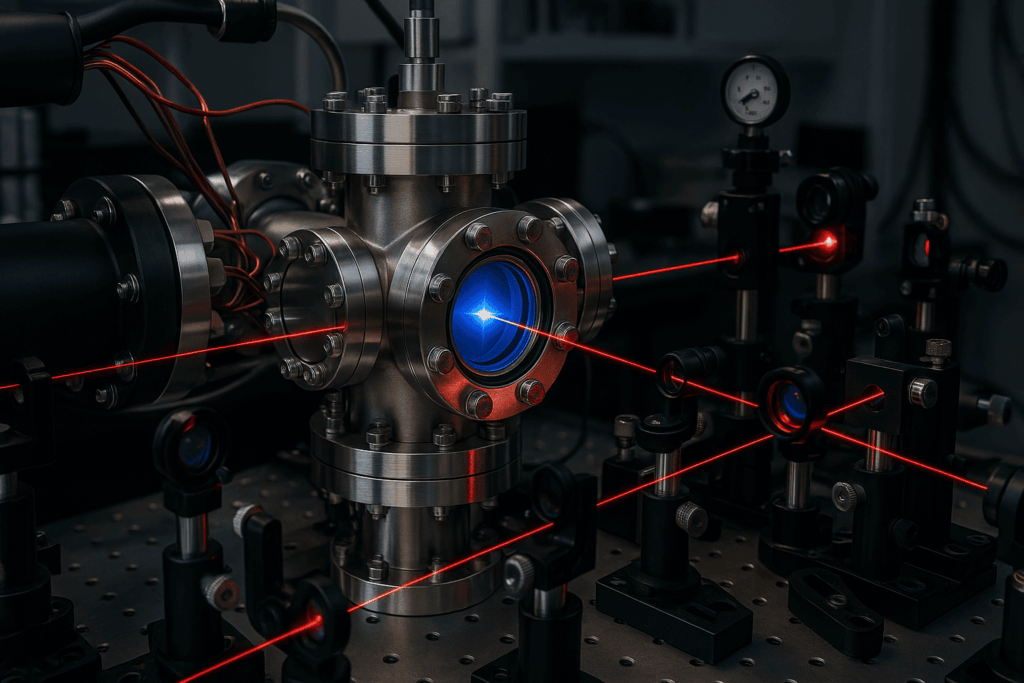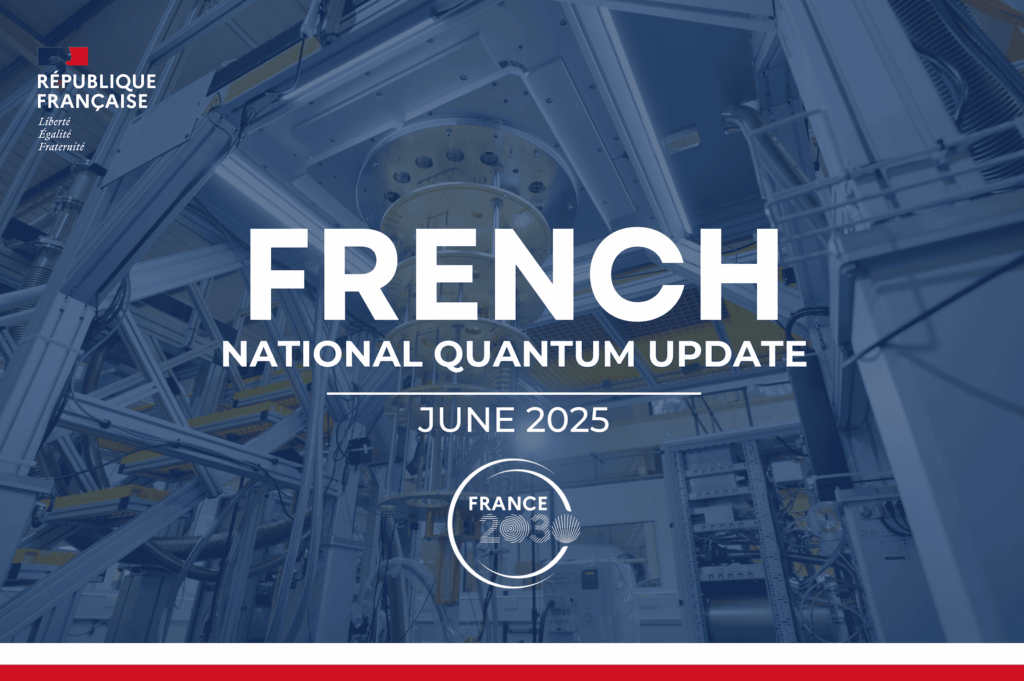After two years of getting to know each other in 2D, it has been exciting to meet and reconnect with colleagues in the quantum industry. This week’s Quantum.Tech conference in Twickenham, London presented an opportunity to network and learn with some of the leading minds in the market.
The covid-driven gap between in-person meetings presented an interesting reset on “where we are”. Opinion was divided between participants who found the same stories being told and those who saw an industry starting to find its commercial feet.
Quantum Computing Roadmaps: Panel Discussion
One of the most interesting sessions at the conference was between representatives from D-Wave (Murray Thom, VP, Product Management), Rigetti Computing (Chad Rigetti, CEO), ColdQuanta (Bob Sutor, VP, Corporate Development) and Quantinuum (Ilyas Khan, CEO). The leaders from each company presented an update on their respective businesses and joined a panel afterwards.
First things first: no one is claiming practical quantum advantage yet. In an earlier panel, the audience had been asked to raise their hand if they had seen a real-world quantum advantage application, resulting in a clear stillness in the room. Yet all the hardware companies are painting an upbeat picture. Khan (Quantinuum) stressed that their business is already delivering useful applications with quantum, and that “we shouldn’t’ just focus on the technology that is twenty years away”. Their Quantum Origin product already delivers verifiable quantum entropy which can only be delivered by a quantum computer.

Thom (D-Wave) went further and stepped away from the concept of a “path to commercialization” arguing that Quantum Computers are already being commercialized today. The executive, who has now been with the business for twenty years, pointed to work for clients such as Save-on-Foods and DENSO. Sceptics in the industry have been quick to question early optimization cases, arguing that such business improvements could have been provided without the use of quantum technology. Others argue that this may be true, but question whether we should care if it provides value.
In a similar vein, Rigetti (Rigetti Computing) focused on the partnerships they are building and presented a bold mission to build the “most powerful computers to solve the world’s most pressing problems”. Whilst some work connected to climate challenges raised some eyebrows from those careful to shut down hyped-up industry statements, what was perhaps more interesting was Rigetti’s views on where he expects the company will see early-stage use cases. The company presented an interesting diagram highlighting their focus on Quantum Machine Learning in the next couple of years. Khan (Quantinuum) volunteered that Quantum Monte Carlo Simulation may be the lower hanging fruit if he was to place a bet, but acknowledging that no one really knows the answer.
Sutor (ColdQuanta) took a different angle, noting that quantum advantage will only be commercially interesting on a longer timeline. He argued their focus on quantum computing was on building large numbers (hundreds of thousands to millions) of high-quality qubits and that practical computational use cases may be further away. “Quantum Advantage is where the integration of quantum and classical systems can do significantly better than classical alone. If we only achieve slightly better, someone sitting in a lab somewhere is going to be asking ‘I really hope somebody cares’”.
This is something that ColdQuanta, who publicly acknowledged that they are currently raising more capital, may have more confidence saying. Their technology – cold atoms – which works by trapping cesium atoms in a grid of laser light in a 2D array, is being commercialized for multiple use cases including atomic clocks and positioning systems. Contrary to many quantum hardware businesses, you can already purchase their hardware products online.
Provable Quantum Advantage and Quantum Computing Benchmarking
The now familiar debate between showing provable quantum advantage and promising experimental results was, of course, a theme throughout the discussion. Rigetti (Rigetti Computing) was clear in his view that “proof can follow after the experimental work” in the same vein seen in the machine learning and AI industries.
Khan (Quantinuum) and Sutor (ColdQuanta) appeared to be pushing for better empirical evidence. Both brought up the challenge of bench-marking today’s systems. In an environment where enterprise-scale business value may seem tantalizingly close, but not quite there yet, companies need to demonstrate technical progress. Khan (Quantinuum) provided an overview of the different approaches and acknowledged that their use of Quantum Volume (where they rank #1 and are committed to achieving 10 times improvements every year) will be used until the community comes up with a better metric. ColdQuanta pointed to their Super.tech acquisition to demonstrate their capabilities in the space.
Industry maturity and revenue generation
Sceptics in the industry point to early quantum computing company revenue as little more than initial Proof of Concept (POC) trials. D-Wave, Quantinuum and Rigetti challenged this view by highlighting where their offerings are being purchased by an increasing growing customer base.
Quantinuum are expecting 100 customers of their INQUANTO platform by the end of the year, an encouraging sign of enterprise adoption. Khan (Quantinuum) flagged the importance of getting quantum into people’s hands at scale: “People who are in research departments are tomorrow’s users…our vast effort to make sure they understand our system is more important than 100 POCs. Whether you’re in Vancouver or Calcutta, however old you are, you have that access”. The business’ TKET offering has moved from being a compiler to a full stack development kit and was fully open sourced last year.
Having a broad or even “full stack” offering is seen as increasingly important by many of the larger providers. Rigetti (Rigetti Computing) argued that “real solutions will require a full stack engineering strategy.” Thom (D-Wave) focused on their hybrid offering, noting that “classical computers and quantum computers are engineers for a different operation”. D-Wave’s approach, at least on the annealing side is to show how certain parts of a problem can be split up and managed partly by a classical computer, and partly by a quantum computer. That classical computing will be an important part of any quantum computing solution is now well understood. Gurobi, a provider of mathematical optimization solvers was an interesting attendee at the event that several commented on.
Collaboration or winner takes all?
Collaboration was an ending thread of the discussion. Quantum industry conferences often have significant time dedicated to hardware companies arguing their approach is the best or even only way. Quantum Source, founded last year, makes this clear proclamation on its website that “Photonics is the only way to deliver useful quantum computers”. The opinion from the larger players appears to have matured.
Khan (Quantinuum) said: “Each of us has a different opinion on which approach will work…this is a normal cycle and happened in automobiles and computer hardware…universality will only happen when we collaborate”. Our quantum market data now shows over fifty companies working on building quantum companies across an increasingly large suite of qubit modalities. Collaboration will be very important, but many are expecting that consolidation will be a key part of the story in 2023 and beyond.
We are also facing a market where financing will play an important role. Two of the companies on the panel went public via a SPAC process earlier this year. Like many such processes across other sectors, investor redemptions meant that the new capital raised gives the companies only a couple of years of runway and represents a significantly smaller amount than originally targeted. Most quantum hardware companies are burning through investor cash at a rapid clip. Rigetti reported a cash balance of $184 million at the end of June, but in the preceding 6-months spent $52 million on core operating expenses and another $10 million on capex. D-Wave appears to be in a similar position, and both appear to have lined up financing providers to provide additional liquidity if required.
This high risk, high reward nature is not something unique to the quantum industry. Those who say that the quantum market is “overhyped” would do well to listen to the CEO’s explain their businesses and roadmaps. Undoubtedly not everyone will succeed but some of today’s innovators and risk takers will be leading the technology companies of the future. However you look at it, quantum companies are highly incentivized to deliver results over the coming few years. We at The Quantum Insider wish them all the best.
For more market insights, check out our latest quantum computing news here.















